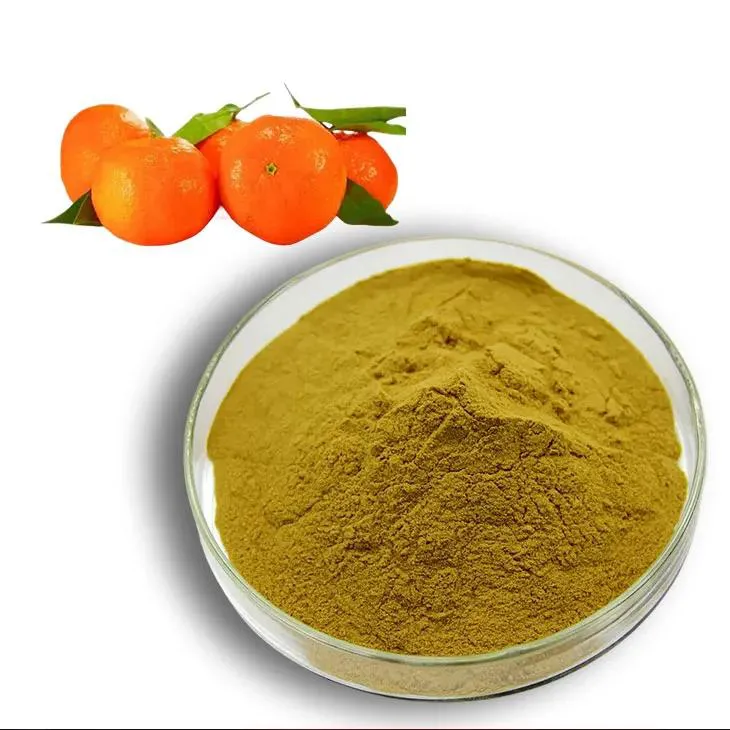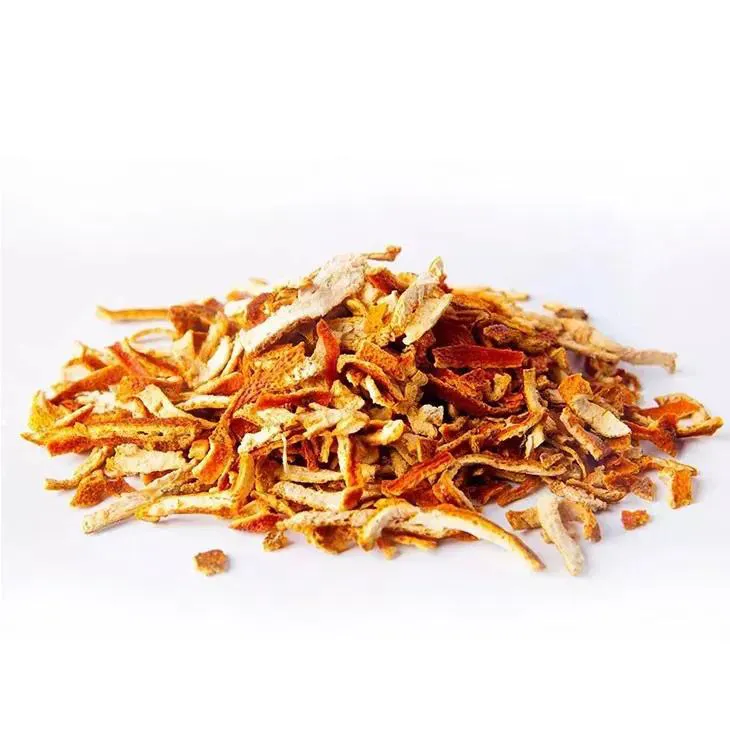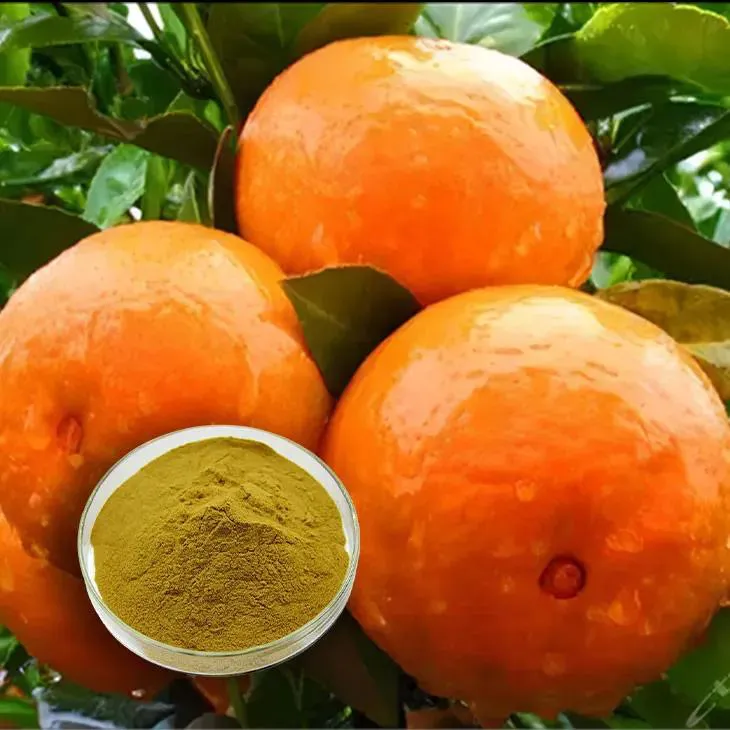- 0086-571-85302990
- sales@greenskybio.com
Citrus bioflavonoids can reduce high blood pressure.
2024-11-13

Introduction
Hypertension, or high blood pressure, is a major global health concern, increasing the risk of heart disease, stroke, and other serious health conditions. Citrus bioflavonoids offer a promising natural alternative for the management of hypertension. These compounds, which are abundantly present in citrus fruits such as oranges, lemons, and grapefruits, have been the subject of extensive research in recent years. Their potential to influence the body's systems involved in blood pressure regulation makes them an interesting area of study.

The Role of Blood Pressure Homeostasis
Blood pressure homeostasis is a complex process that involves multiple physiological mechanisms. The body maintains blood pressure within a relatively narrow range to ensure proper perfusion of tissues and organs. Key factors in blood pressure regulation include the heart's pumping ability, the resistance of blood vessels, and the volume of blood in the circulatory system.
Vasodilation and vasoconstriction play crucial roles in adjusting blood vessel resistance. When blood vessels dilate, the diameter of the vessels increases, reducing resistance and thereby lowering blood pressure. Conversely, vasoconstriction narrows the blood vessels, increasing resistance and elevating blood pressure.
Another important aspect is the modulation of blood lipids. Abnormal levels of blood lipids, such as high cholesterol or triglycerides, can contribute to the development of atherosclerosis, which in turn can lead to increased blood pressure. Therefore, any compound that can influence these factors has the potential to impact blood pressure regulation.

Citrus Bioflavonoids: An Overview
Citrus bioflavonoids are a group of polyphenolic compounds that are found in the peel, pulp, and juice of citrus fruits. They are classified into different sub - groups, including flavanones, flavones, and flavonols. Some of the well - known citrus bioflavonoids are Hesperidin, naringin, and Quercetin.
These bioflavonoids are known for their antioxidant properties. They can scavenge free radicals in the body, which are unstable molecules that can cause damage to cells and tissues. By reducing oxidative stress, citrus bioflavonoids may contribute to overall cardiovascular health.
Moreover, citrus bioflavonoids have anti - inflammatory effects. Chronic inflammation is associated with the development of hypertension and other cardiovascular diseases. By suppressing inflammatory pathways, these bioflavonoids may help in preventing or managing hypertension.

Impact on Vasodilation
Mechanisms of Action
Citrus bioflavonoids can promote vasodilation through several mechanisms. One of the main ways is by increasing the production of nitric oxide (NO) in the endothelial cells lining the blood vessels. Nitric oxide is a potent vasodilator that relaxes the smooth muscle cells in the blood vessel walls, leading to an increase in vessel diameter.
Some citrus bioflavonoids, such as Hesperidin, have been shown to enhance the activity of endothelial nitric oxide synthase (eNOS), the enzyme responsible for the production of nitric oxide. This up - regulation of eNOS activity results in increased nitric oxide levels, which in turn promotes vasodilation.
Another mechanism involves the modulation of calcium channels in the smooth muscle cells of blood vessels. Citrus bioflavonoids can inhibit the influx of calcium ions into these cells. Since calcium is required for muscle contraction, a reduction in calcium influx leads to relaxation of the smooth muscle cells and subsequent vasodilation.
Evidence from Studies
Several animal and human studies have provided evidence for the vasodilatory effects of citrus bioflavonoids. In animal models of hypertension, treatment with citrus bioflavonoids has been shown to reduce blood pressure. For example, in rats with experimentally - induced hypertension, Hesperidin supplementation led to a significant decrease in systolic and diastolic blood pressure.
In human studies, consumption of citrus fruits or citrus bioflavonoid supplements has also been associated with improved blood vessel function. A study involving healthy volunteers found that ingestion of a citrus bioflavonoid - rich extract resulted in enhanced endothelial - dependent vasodilation, as measured by flow - mediated dilation (FMD) of the brachial artery.
Effect on Blood Lipid Modulation
Lipid - Lowering Properties
Citrus bioflavonoids can have a positive impact on blood lipid profiles. They can lower levels of low - density lipoprotein cholesterol (LDL - C), often referred to as "bad" cholesterol. One of the ways they achieve this is by inhibiting the absorption of dietary cholesterol in the intestine.
Some bioflavonoids also stimulate the liver to increase the production of high - density lipoprotein cholesterol (HDL - C), or "good" cholesterol. HDL - C plays a crucial role in removing excess cholesterol from the bloodstream and transporting it back to the liver for excretion.
Furthermore, citrus bioflavonoids can reduce triglyceride levels. Elevated triglycerides are a risk factor for cardiovascular disease, and by lowering them, these bioflavonoids may contribute to better blood pressure control.
Clinical and Epidemiological Evidence
Clinical trials have demonstrated the lipid - modulating effects of citrus bioflavonoids. In a study of patients with hyperlipidemia, supplementation with a citrus bioflavonoid complex led to significant reductions in LDL - C and triglyceride levels, while HDL - C levels remained stable or slightly increased.
Epidemiological studies have also provided support for the relationship between citrus fruit consumption and improved blood lipid profiles. Populations with a high intake of citrus fruits tend to have lower levels of LDL - C and triglycerides compared to those with a low intake.
Other Potential Benefits for Hypertension Management
In addition to their effects on vasodilation and blood lipid modulation, citrus bioflavonoids may offer other benefits in the management of hypertension.
- Antioxidant Protection: By reducing oxidative stress, they can protect the heart and blood vessels from damage. Oxidative stress can lead to endothelial dysfunction, which is an early step in the development of hypertension. Citrus bioflavonoids can scavenge free radicals and prevent the oxidation of lipids and proteins in the cardiovascular system.
- Anti - Inflammatory Action: Chronic inflammation is involved in the pathogenesis of hypertension. Citrus bioflavonoids can inhibit the production of inflammatory cytokines and mediators, thereby reducing inflammation in the body. This anti - inflammatory effect may contribute to better blood pressure control.
- Renin - Angiotensin - Aldosterone System (RAAS) Modulation: Some studies suggest that citrus bioflavonoids may have an impact on the RAAS, which is a key hormonal system involved in blood pressure regulation. By inhibiting the activity of renin or angiotensin - converting enzyme (ACE), these bioflavonoids may help to lower blood pressure.
Dosage and Sources
Citrus fruits are the natural source of citrus bioflavonoids. Eating a variety of citrus fruits, such as oranges, lemons, limes, and grapefruits, can provide a good amount of these bioflavonoids. For example, oranges are rich in hesperidin, while grapefruits contain naringin.
If supplementation is desired, citrus bioflavonoid supplements are available in the market. However, it is important to note that the optimal dosage has not been fully established. In general, doses ranging from 500 - 1000 mg per day of citrus bioflavonoid extracts have been used in some studies, but more research is needed to determine the most effective and safe dosage.
Conclusion
Citrus bioflavonoids show great potential in the management of hypertension. Their ability to promote vasodilation, modulate blood lipids, and offer other cardiovascular benefits makes them an attractive option for those looking for natural ways to control blood pressure.
However, more research is still needed to fully understand their mechanisms of action, optimal dosage, and long - term safety. Future studies should also explore the potential synergistic effects of citrus bioflavonoids with other antihypertensive medications and lifestyle interventions.
FAQ:
What are citrus bioflavonoids?
Citrus bioflavonoids are a group of plant - based compounds found abundantly in citrus fruits such as oranges, lemons, and grapefruits. They are secondary metabolites that play various roles in plants, including protection against UV radiation and pathogens. In the human body, they have been associated with potential health benefits, one of which is related to blood pressure regulation.
How do citrus bioflavonoids reduce high blood pressure?
Citrus bioflavonoids may reduce high blood pressure through multiple mechanisms. One way is by promoting vasodilation, which means they help to relax the blood vessels, allowing for easier blood flow and thus reducing the pressure within the vessels. Another mechanism could be through modulating blood lipid levels. By influencing lipid metabolism, they may help prevent the build - up of atherosclerotic plaques in the arteries, which can contribute to lower blood pressure as the arteries remain more open and flexible.
Are there any side effects of using citrus bioflavonoids for blood pressure control?
When consumed in normal dietary amounts through citrus fruits, citrus bioflavonoids are generally considered safe. However, when taken in large amounts in supplement form, some people may experience mild side effects such as gastrointestinal discomfort, including nausea, diarrhea, or abdominal pain. Additionally, there could be potential interactions with certain medications, especially those used for blood pressure control or blood thinning. So it's important to consult a healthcare provider before starting any new supplement regimen.
How much citrus bioflavonoids should one consume to potentially lower blood pressure?
There is no one - size - fits - all answer as it can vary depending on individual factors such as age, overall health, and the presence of other medical conditions. However, a diet rich in citrus fruits, which are natural sources of bioflavonoids, is generally recommended. If considering supplements, it's best to follow the advice of a healthcare professional who can take into account your specific situation and guide you on an appropriate dosage.
Can citrus bioflavonoids replace blood pressure medications?
No, citrus bioflavonoids should not be used as a replacement for blood pressure medications without consulting a doctor. While they may offer some benefits in blood pressure regulation, medications are often prescribed based on a comprehensive assessment of a patient's blood pressure levels, overall health, and risk factors. However, incorporating citrus bioflavonoids through diet or under medical supervision in supplement form may be used as part of a comprehensive approach to managing blood pressure.
Related literature
- The Role of Citrus Bioflavonoids in Cardiovascular Health"
- "Citrus Bioflavonoids and Blood Pressure: Current Research Findings"
- "Bioflavonoids from Citrus Fruits: Potential Benefits for Hypertension Management"
- ▶ Hesperidin
- ▶ citrus bioflavonoids
- ▶ plant extract
- ▶ lycopene
- ▶ Diosmin
- ▶ Grape seed extract
- ▶ Sea buckthorn Juice Powder
- ▶ Beetroot powder
- ▶ Hops Extract
- ▶ Artichoke Extract
- ▶ Reishi mushroom extract
- ▶ Astaxanthin
- ▶ Green Tea Extract
- ▶ Curcumin Extract
- ▶ Horse Chestnut Extract
- ▶ Other Problems
- ▶ Boswellia Serrata Extract
- ▶ Resveratrol Extract
- ▶ Marigold Extract
- ▶ Grape Leaf Extract
- ▶ blog3
-
Cranberry Plants and Skin - care Products.
2024-11-13
-
Peppermint Extract Powder
2024-11-13
-
Beta Carotene
2024-11-13
-
Bayberry Extract
2024-11-13
-
Berberis aristata Extract
2024-11-13
-
Maca Extract
2024-11-13
-
Cranberry Extract
2024-11-13
-
Agaricus Blazei Extract
2024-11-13
-
Curcuma Longa Extract/Turmeric extract
2024-11-13
-
Medicinal Marshmallow Extract
2024-11-13
-
Mangosteen extract powder
2024-11-13





















